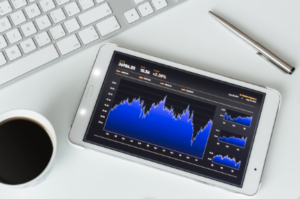
But investing in financial markets is something everyone should consider and it doesn’t have to be complicated. In this guide, we explain what the stock market is, how it works and how to go about investing in the stock market for the first time.
What is the stock market?
The stock market is a forum where investors can buy and sell shares in publicly listed companies. Some of the largest stock exchanges in the world are the New York Stock Exchange, the Nasdaq, the Hong Kong Stock Exchange and the London Stock Exchange. Although exchanges have physical locations, trading nowadays takes place electronically.
Why invest in the stock market?
Investing in the stock market gives you a better chance of maximising your money. There are no guarantees, of course, and it’s true that you could lose money, but history has shown that investing over the long term (that’s ten years plus) gives you a far better return than if you had just saved in cash in a bank account. They also tend to outperform other types of assets such as bonds and property. The average annual return from the FTSE All Share over the last 30 years was nearly 10% (according to investment platform Vanguard), although there was plenty of volatility year on year, so investors must take a long view.
What is a share?
Companies issue shares as a way to raise capital to enable them to grow. When you buy a share, you are buying a little slice of a particular company. Your slice is tradeable, and can go up or down in price depending on how well or badly the company is performing.
If it does well over time and the business grows and becomes more profitable, the value of your share should increase. Equally, if the company performs badly, your shares could fall in value. The two main types of shares are ordinary and preference shares. There are also fractional shares which allow smaller investors to own part of a company.
Ordinary shares
Ordinary shares give you voting rights, which means you have a say in how the company is run.
Preference shares
Preference shares mean you are first in line to receive dividends. Dividends are a way for companies to reward their shareholders by making payments out of their excess profit. Many investors like to hold dividend-paying shares to generate a regular income.
Fractional shares
Fractional shares allow you to buy part of a share in a company. If you're a beginner investor and don't have the money to purchase a full share from the outset, buying a fractional share allows you to invest in the company with less money.
Things you should know before investing in the stock market
Investing in the stock market comes with risk to your money. The main risks of investing are that you could end up with less than you put in, or your investments don’t perform well enough to give you a decent retirement fund. However, if you invest over a long enough timescale, you stand a better chance of making money in the end. There is a general rule of thumb that states the more risk you take, the greater the rewards you could make. But this is quite a simplistic view and doesn’t reflect the reality of investing.
Yes, there is the potential for better returns, but investing in very risky things just means you’re taking a bigger gamble with your money. For most investors, there’s a happy medium between chasing big wins in high-risk, speculative growth stocks and just putting your cash in a savings account where it will be safe but it won’t earn any interest and will be eroded by inflation.
Understanding risk
When we talk about risk tolerance or risk appetite, this refers to the level of risk you are willing or able to take. This will depend on several factors such as your age, how close you are to retirement age, and how much money you have (and could afford to lose). But it’s also about personal preference and your behavioural approach to investing – are you someone who can hold their nerve in rough markets and take short-term losses on the chin, or would you panic and want to cash out the moment markets take a tumble?
Can you invest in the stock market as a beginner?
If you’d like to have a go at investing, you might be wondering ‘how much money do I need to invest in the stock market?’ The good news is that it’s now easier than ever to start investing in the stock market, even if you’re a complete beginner. Some robo-advisers (more on these later) will let you set up a portfolio with as little as £1, and most online stockbrokers and fund supermarkets offer regular savings plans with minimum monthly investments of £25 - £50.
Pound cost averaging vs lump sum investment
Regular savings allow you to drip-feed money into the stock market month on month, rather than paying in a lump sum all at once. It’s a good idea in falling markets because it means you’d buy more shares when prices and cheaper and fewer shares when prices are higher. This is called pound cost averaging.
If you put in a lump sum, you run the risk that the market might fall shortly after you invest, immediately eroding some of your capital. But, of course, it works both ways, and the market could go up shortly afterwards. Waiting for the perfect moment is called trying to time the market, and it’s impossible to do even for the experts, so regular savings probably make more sense for most people over the long run.
How does investing directly in the stock market work?
You can hold shares directly or through a fund (more on these in the next section). If you want to buy individual shares you will usually need to use an intermediary such as a stockbroker. Some highly regarded share dealing services (many of which offer funds too) include Freetrade*, Hargreaves Lansdown, AJ Bell, and Barclays. While some of these providers are high-street banks, others are online-only services. You will notice the services on offer and fees will vary significantly between the different options.
How much does it cost to invest in the stock market?
Share trading apps such as Freetrade* are specifically designed to allow you to buy and sell shares fee-free. That said, there may be additional subscription fees and foreign exchange markups that could increase the amount you pay. Funds charge management fees too. If you opt to invest in an actively managed fund (typically a mutual fund), fund fees will be higher. ETFs, which are generally passive funds, typically cost less.
Some platforms will offer discounts for regular traders too. You will also have to pay a fee to use the platform, which might be a flat fee or a percentage of the money you hold on the platform. There may be other charges too, for example, if you want to transfer your portfolio to another provider, so check the small print.
The table below provides an overview of what the different platforms offer and what fees you can expect.
| Freetrade* | Hargreaves Lansdown* | AJ Bell* | Barclays Smart Investor | |
| Platform fees | From £0 to £9.99 per month | Between 0.1% to 0.45% depending on your account and the amount invested. | 0.10% to 0.25% per annum | Between 0.05% to 0.25%
0.45% for ready-made funds |
| Trading fees | None | £5.95 to £11.95 depending on number of deals | £3.50 to £5 for shares dealing; £1.50 for fund dealing | £6 per deal |
| FX fees | 0.99% with free plan (0.39% to 0.59% with paid plans) | From 0.25% | From 0.25% | Between 0.1% to 1% |
| Minimum investment | £2 | £1 | £0 | £50 |
| Fractional shares | YES | NO | NO | NO |
| ETFs | YES | YES | YES | YES |
| Mutual funds | NO | YES | YES | YES |
| Stocks and Shares ISAs | YES | YES | YES | YES |
| Trustpilot rating | 3.9 out of 5.0 | 4.2 out of 5.0 | 4.8 out of 5.0 | 1.8 out of 5.0 |
There are plenty of guides and comparison tools out there to help you choose one, but primarily you’ll probably want to consider the choice on offer, the cost, if there is any free investment research, and how user-friendly the platform or service is. For help choosing a share dealing platform, have a look at our general investment account best buy table.
How do you actually buy and sell shares?
In the olden days, you phoned your stockbroker with your dealing instructions, or even sent a form by post, and some people still do this, but nowadays it’s much easier and cheaper to log into an online share trading account to send an instruction. If you do this after hours, your broker will try to execute the trade as soon as the market opens. There are a few different types of orders you can set up depending on your provider. Some popular options include:
- A ‘kill or fill’ instruction which tells your broker to try to buy or sell shares at a price target you set, or else cancel the order if they can’t get that price straight away
- A ‘stop-loss’ order which triggers a sale of shares you hold if they fall below a price you set
- A 'limit order' which automatically buys or sells shares when they reach a price you set
Usually holding shares directly will be more suitable for experienced or sophisticated investors. That’s because share dealing is more expensive than trading funds, and the risks of owning shares can be higher as you are concentrating your money in fewer individual shares rather than spreading your risk across a fund which holds many different ones. For most people, especially beginner investors, a better option will be to pool your money with other people and hold shares within an investment fund. If you are new to investing in shares, then check out our article 'How to buy shares for beginners'
Investing using funds
A fund is simply a way of owning a basket of stocks, rather than just one or two. When you invest in a fund, a professional fund manager makes investment decisions on your behalf, buying and selling shares (or other types of financial instruments) to try to meet the fund’s stated objective. This might be to deliver an income, or to grow your capital by investing in a particular region or sector, for example.
There are funds for everything – whether you want to invest only in the UK stock market, small businesses from around the world, technology companies, socially responsible companies, or frontier markets, there will be a fund that can meet your needs. You’ll need to think about whether you want to invest through an active or a passive fund. Active funds aim to outperform their benchmark (a relevant index) while passive funds just try to replicate the performance of their benchmark.
Active funds
Active funds are more expensive because you’re paying a professional to ‘actively’ manage your investments, researching and meeting companies and keeping on top of market-moving events to decide what to buy and sell and when. You’re also paying for the higher transaction costs associated with more frequent trading. But, even though you pay more for potential outperformance, active funds have been criticised as the majority have failed to beat their benchmarks over the long term.
Passive funds
Passive funds such as exchange-traded funds (ETFs) or index trackers buy and hold the same stocks that are in their index, they don’t try to anticipate what the market will do. This means they won’t outperform, but they aren’t trying to. If the market falls, your passive fund will fall, whereas an active manager has a better chance of reacting to reduce losses in falling markets. Despite this, passive funds are very popular as a low-cost, no-frills way to get exposure to major markets. Many investors use a combination of active and passive funds in their portfolios.
How do you invest in a fund?
The cheapest way to invest in a fund is usually to sign up to a fund platform or supermarket. You can choose a general investment account or a Stocks and Shares ISA (check out our best Stocks and Shares article to help you choose one). It's generally better to invest via a Stocks and Shares ISA if you can do so because you get a £20,000 tax free allowance each year. This means you can deposit up to £20,000 within the ISA and any returns you make will be tax free.
You just top up your account with cash and pick your funds (or portfolio of funds) and how much you want to put in each, or set up an automatic regular savings plan and the platform does the rest.
Why choose funds over shares
It is usually cheaper to buy and sell funds than shares, and some online brokers and fund supermarkets won’t charge you at all for trading funds. However, when you hold funds you do also pay a management fee to the fund manager on top of your platform fee.
That said, tracker funds which aim to replicate an index are typically very low cost and also offer diversification which you won't find if you're investing in shares. As such, they can spread the risk of investment which will appeal to more risk-averse investors. Returns will not necessarily be as high as they could be if you invested in individual shares - but likewise, losses are likely to be less dramatic too.
Where should I invest my money?
Investing in the stock market is easier than ever. There are lots of options available to suit every investor nowadays.
If you want to buy shares directly, you’ll need to choose a share dealing service. Comparison websites and best buy tables are a good place to start, as you can see what the various share dealing services offer and compare fees and charges at a glance. Be sure to do your homework on the company before you take the plunge and buy shares. Read the financial press – titles like Money Observer, Investors Chronicle, MoneyWeek and Shares are full of share tips and investing guides.
A robo-adviser such as Nutmeg or Wealthify could be a good route for a novice investor – these services typically offer you a choice of ready-made passive portfolios depending on your appetite for risk. Often their charges are competitive because they use exchange-traded funds, and some have very low minimum investments to help you get started. Have a look at our robo-adviser best buy table for more information.
You can hold funds and shares in a tax-efficient way through a Stocks & Shares ISA (or a pension). We’ve put together a best buy table of Stocks & Shares ISAs or alternatively you can read our article 'The best stocks and shares ISA and the best fund platform'.
You can buy active and passive funds through the major fund supermarkets such as AJ Bell and Hargreaves Lansdown. But if you’re interested primarily in passive funds, there are specialist platforms available through which you can buy them direct from the provider, such as Vanguard Investor.
So that’s our brief overview of how to invest in shares. For a deeper dive, consider signing up to our 80-20 Investor service which is a mine of information with detailed research into the best investment opportunities in the marketplace.
If a link has an * beside it this means that it is an affiliated link. If you go via the link, Money to the Masses may receive a small fee which helps keep Money to the Masses free to use. The following link can be used if you do not wish to help Money to the Masses or take advantage of any exclusive offers - Freetrade, Hargreaves Lansdown, AJ Bell




